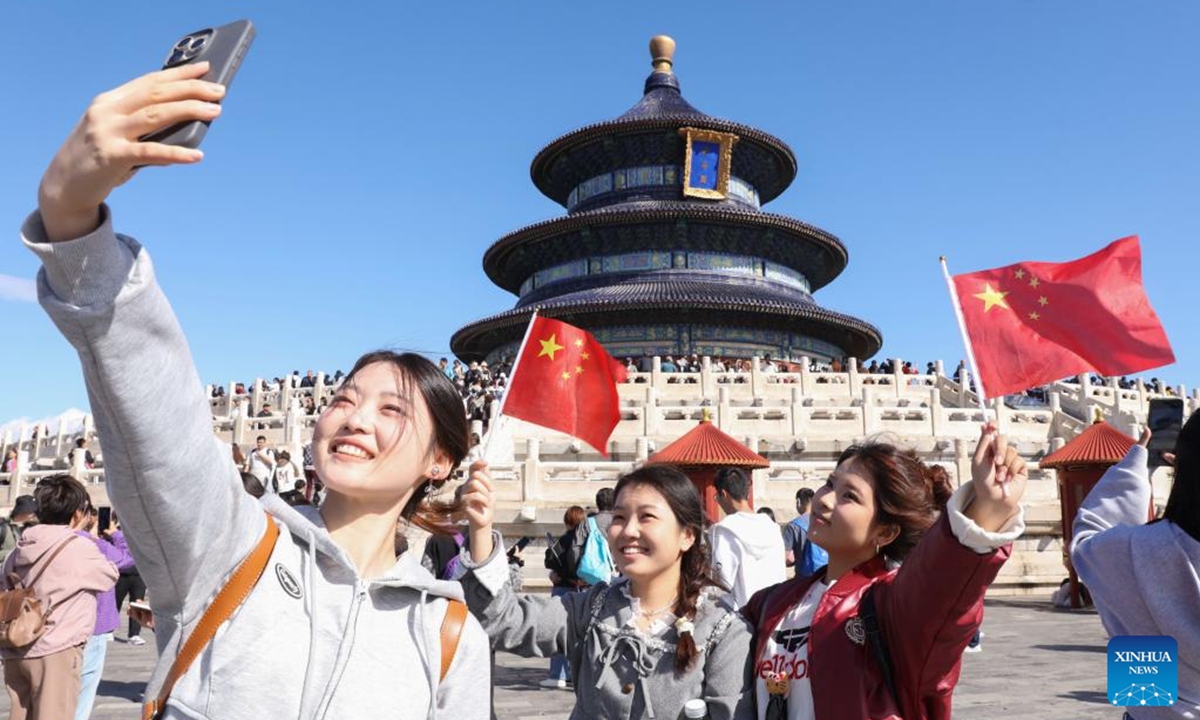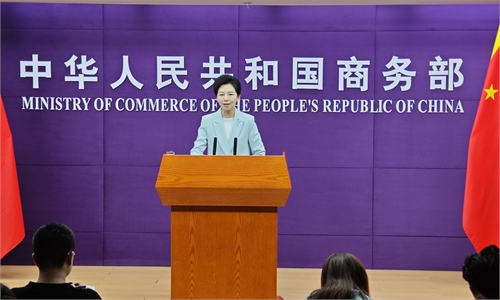
Tourists take selfies at Tiantan (Temple of Heaven) Park in Beijing, capital of China, Oct. 1, 2024. The National Day holiday period, which runs from Oct. 1 to Oct. 7 this year, is a peak travel and tourism season in China. (Photo: Xinhua)
The 22nd Shangri-La Dialogue will be held in Singapore later this week. It is a platform dominated by Western countries to challenge China, but it is also a platform where Chinese participants deliver China's stance and safeguard China's national interests. Although I will not attend it as I did in previous years, I will closely watch it from afar.
I remember when I attended it last year, a Western journalist posed the question to me, "You often mention 'China's core interests' and even 'the core of China's core interests.'
But what exactly are these core interests?" I also remember in November 2023 when I visited San Francisco as part of a delegation attending a "China-US Track II Dialogue," a well-known American scholar posed the same question to me. I gave a clear answer on both occasions.
Recently, China's State Council Information Office released a white paper titled "China's National Security in the New Era," which pointed out that China's national security in the new era is one that takes national interests as the guiding principle. It clearly states that China's efforts to safeguard national security are primarily about protecting national interests, particularly core interests.
National interests are sacred and inviolable - this is especially true when facing external forces. Since the founding of the People's Republic of China, heroic acts of defending national sovereignty and territorial integrity have all been testaments to the Chinese people's willingness to defend national interests with their blood and lives.
The anti-China forces have never ceased in their attempts to subvert China. For years, they have regarded China as their most consequential geopolitical challenge, attempting to suppress China and bring about its "collapse" in every possible way.
Yet, under the strong leadership of the Communist Party of China (CPC) and with the united efforts of all Chinese people, China has not changed the way it is, has not been "brought down," and has certainly not "collapsed." On the contrary, it has grown increasingly prosperous and powerful - transforming from standing up and growing prosperous to becoming strong.
National interests must not be harmed, let alone betrayed. In any country, there are always a few people who, out of personal or clique interests that conflict with or even oppose the national interest, are willing to damage or sell out national interests to serve their own agendas.
This year marks the 80th anniversary of the victory in the Chinese People's War of Resistance Against Japanese Aggression and the World Anti-Fascist War. During that great war, figures such as Wang Jingwei defected to the Japanese invaders, formed a puppet regime and actively supported Japanese militarism in its aggression against China.
They became infamous national traitors, reviled by history for their betrayal of national interests - one of the most shameful episodes in modern Chinese history.
National interests are paramount. Core national interests, in particular, must be defended and upheld even at the cost of blood and life.
A nation's core interests are the most vital components of its national interests. They involve sovereignty, security, unity and development - the essential interests that determine the country's fate and future, the well-being as well as the survival of its people. These are supreme interests that must be resolutely defended with all national strength and means, and which no force may be allowed to violate or undermine. At the heart of these core interests are the most critical, fundamental and supreme concerns.
China's core interests are primarily reflected in three areas: One, the leadership of the CPC and the socialist system must not be altered. Two, China's territorial integrity, sovereignty, security and national unity must not be infringed upon. Three, the historical process of national rejuvenation must not be disrupted.
Among these, the second aspect, in the foreseeable future, includes matters ranging from the Taiwan question, the issues in the South and East China Seas to the China-India border dispute. All of these are China's core interests, but among them, the most important, the most fundamental, the very core of the core is the Taiwan question - that is, the cause of national reunification.
In conclusion, to safeguard national security, we must firmly etch the concept of national interest in our hearts and raise it high above our heads. We must resolutely defend national interests and fight uncompromisingly against any actions that harm, infringe upon or sell out those interests - regardless of the cost, even if it requires blood and sacrifice.
The author is a PLA Lieutenant General and former vice president of the Academy of Military Sciences of the PLA. opinion@globaltimes.com.cn


